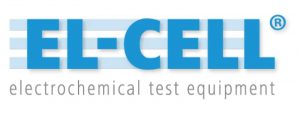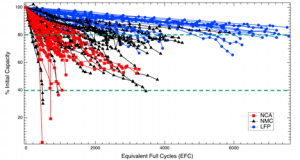Reed M. Wittman
Senior Member, Technical Staff
Energy Storage Technology and Systems Group
Sandia National Laboratories
Yuliya Preger
Principal Member, Technical Staff
Energy Storage Technology and Systems Group
Sandia National Laboratories
Date: June 12, 2024
Time: 1000–1100h ET
The true useful life of Li-ion batteries is not well defined. Current operational cutoffs are often at 80 percent capacity retention, a holdover from the early electric vehicle industry that may not be applicable to other applications such as energy storage for the grid. Thus, there is little data in the open literature about systematic cycling of Li-ion batteries beyond the traditional 80 percent cutoff. This webinar details our ongoing study of battery cycle aging at varied ambient temperature, discharge rate, and state of charge range for three different positive electrode chemistries: Lithium Iron Phosphate, Nickel Cobalt Aluminum Oxide, and Nickel Manganese Oxide. These commercial cells have been cycled for over seven years and their capacity retention spans 80 percent to 40 percent. Trends are covered that occur before and after 80 percent capacity, initial materials characterization, knee point occurrence, and sudden cell failure. This work represents the broadest assessment of commercial Li-ion battery aging in the open literature.
An interactive Q&A session follows the presentation.
Benefits of attending the webinar
Learn about:
- Impacts of different cycling conditions on battery useful life;
- Variation in battery performance before and after 80 percent capacity;
- Knee points in Li-ion battery degradation.
Presenters
 Reed Wittman is a Senior Member of Technical Staff at Sandia National Laboratories. His work focuses on fundamentals of battery reliability and safety. This includes materials and electrochemical characterization of Li-ion battery degradation mechanisms during long-term cycling and fundamental origins of gas evolution in aqueous flow batteries. He earned his BSE in Material Science Engineering at Arizona State University in 2013. He then went on to complete a PhD in Energy Science and Engineering through the Bredesen Center, an interdisciplinary degree program centered on all aspects of energy, at the University Tennessee and Oak Ridge National Laboratory. His PhD dissertation focused on using materials and electrochemical methods to understand the fundamental processes at the Zinc (Zn) electrode of alkaline Zn batteries.
Reed Wittman is a Senior Member of Technical Staff at Sandia National Laboratories. His work focuses on fundamentals of battery reliability and safety. This includes materials and electrochemical characterization of Li-ion battery degradation mechanisms during long-term cycling and fundamental origins of gas evolution in aqueous flow batteries. He earned his BSE in Material Science Engineering at Arizona State University in 2013. He then went on to complete a PhD in Energy Science and Engineering through the Bredesen Center, an interdisciplinary degree program centered on all aspects of energy, at the University Tennessee and Oak Ridge National Laboratory. His PhD dissertation focused on using materials and electrochemical methods to understand the fundamental processes at the Zinc (Zn) electrode of alkaline Zn batteries.
 Yuliya Preger is a Principal Member of Technical Staff in the Energy Storage Technology and Systems Group at Sandia National Laboratories. She earned her BS and PhD in Chemical Engineering from the Massachusetts Institute of Technology and University of Wisconsin–Madison respectively. Her current work is centered on the safety and reliability of batteries for grid-level energy storage applications. Her publications span battery degradation and abuse response, application of power electronics to energy storage safety, and system level energy storage safety analysis. Dr. Preger is co-founder of batteryarchive.org, the first public repository for visualization and comparison of battery degradation data across institutions, which has been used by thousands of individuals in academia and industry in over 60 countries. She is currently leading the revision of the Department of Energy (DOE) Office of Electricity Energy Storage Safety Strategic Plan and the development of data collection requirements for DOE-funded energy storage projects across the US.
Yuliya Preger is a Principal Member of Technical Staff in the Energy Storage Technology and Systems Group at Sandia National Laboratories. She earned her BS and PhD in Chemical Engineering from the Massachusetts Institute of Technology and University of Wisconsin–Madison respectively. Her current work is centered on the safety and reliability of batteries for grid-level energy storage applications. Her publications span battery degradation and abuse response, application of power electronics to energy storage safety, and system level energy storage safety analysis. Dr. Preger is co-founder of batteryarchive.org, the first public repository for visualization and comparison of battery degradation data across institutions, which has been used by thousands of individuals in academia and industry in over 60 countries. She is currently leading the revision of the Department of Energy (DOE) Office of Electricity Energy Storage Safety Strategic Plan and the development of data collection requirements for DOE-funded energy storage projects across the US.
Learn more about upcoming ECS Webinars and review our previous webinar recordings.
Thank you to our webinar sponsors who make these complimentary programs possible!
 |
 |
|||
 |
 |
Interested in presenting in the ECS Webinar Series? Email your presentation title and abstract to education@electrochem.org for consideration.



